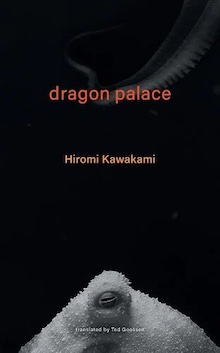
Stone Bridge Press/MONKEY, 2023
Readers of Hiromi Kawakami’s story collection Dragon Palace may find themselves unsettled. Her book, which could have perhaps more accurately been titled “People and Gods,” offers tales of individuals’ interactions with shapeshifting animals, five hundred-year-old men, magical beings, and mythical Japanese deities.
Translated from the Japanese by Ted Goossen, the eight stories take place in restaurants and bars, on beaches, in woods and labyrinths. Overarchingly, the stories concern themselves with being human and with death—states that are identical, and which must be accepted. In each story, characters take conclusive action affirming that, as humans, they must accept their circumstances rather than try to progress from them.
Unexpectedly, the power dynamics of the human-god relationships skew in favor of the humans. The gods are needy – hungry, lonely, sad – and the humans take it upon themselves to help them. The humans are almost always lost, but the needs of the fickle, disordered gods give the humans structure, a path. The gods are a vehicle for the human.
The opening story, “Hokusai,” is narrated by an unemployed young man who goes to the beach to be alone. One night an old man appears and convinces the narrator to buy him a drink. The old man is in fact an octopus who has left the sea and transformed himself into a human. He arrived on land in search of sweet potatoes and stayed there to enjoy the women. “I am a man who loves women,” he says. “Women are soft, cruel, delightfully thoughtless creatures. A man’s worth hinges on how much pleasure he can give them.”
The octopus-turned-man tells stories while convincing the narrator to continue buying him food and drinks. Out on the street, the octopus encourages the narrator to rate the attractive women in the crowd. Although hesitant at first, the narrator participates in the game until the octopus picks out his favorite, one with a “big butt.” He leads the narrator on a frantic chase, sending the woman into desperate flight.
For a reader this is the moment of unease: the octopus has awakened something deeply predatory in the aimless narrator. Of course he needs to move beyond his nights on empty beaches. But, as his participation in this blind chase indicates, he has only propelled himself into a new darkness.
Using matter-of-fact simplicity to create these startling moments, Kawakami’s prose is often beautiful. Her stories seduce with their environs: dark nights, bars, apartment complexes that are specific yet vague, atmospheric. Yet like many translated works, this one suffers from a certain sense of approximation. At times, something feels missing, as if the language had depths that are not quite conveyed.
In the titular story “Dragon Palace,” a woman meets her great-grandmother, Ito, who has arisen from the dead in a tiny body that shifts in age and who promises to reveal the woman to herself. The woman cooks for Ito, listens to her and inevitably is repulsed. What matters is not Ito, the strange ancestor, but the woman’s unease. Ito summarizes the woman’s life: “Having been born, you eat, learn, mate, forget, sleep, die.” Ito makes a big deal about knowing this, but it’s not interesting so much as it is just obvious. The insight doesn’t live up to Ito’s promise.
One of the most fascinating stories, “The Roar,” is both weird and sexually charged. Trapped in a surreal labyrinth, the story’s male narrator grows up while moving through relationships with his seven sisters, one after another. These sisters range from maternal to abusive, ambivalent to sexual. Much is made of their bodies: “They were all beautiful—the napes of their necks, their heels, their breasts.” The beauty of the most maternal sister, Ichiko, is described in exalted in descriptions like this one: “Ichiko’s breasts were exceptional […] they were firm and full—tiny pale blue veins crisscrossed their immaculate whiteness.”
The focus on the narrator’s movement through a labyrinth feels Homeric—or it is a departure from that old story, an aberration, a joke? The set-up is recognizably archetypal: we have a lost man, there is a labyrinth. But the content—the firm, beautiful breasts—subverts that seriousness.
In an offhand line in “Hokusai,” Kawakami describes the view from the lonely beach her narrator inhabits: “A searchlight spun round and round, illuminating the ocean’s surface in an unending circle.” In many ways this is what Kawakami achieves in Dragon Palace: she shows the haunting surface over the sea of human feeling, lit dimly by an endlessly turning lamp.
+++
Hiromi Kawakami is one of Japan’s most popular novelists. Many of her books have been published in English, including Manazuru, The Nakano Thrift Shop, Parade, Record of a Night Too Brief, Strange Weather in Tokyo (shortlisted for the Man Asian Literary Prize in 2013), and The Ten Loves of Nishino. People from My Neighborhood, translated by Ted Goossen, was published in 2020.
+
Ted Goossen is the editor of The Oxford Book of Japanese Short Stories. He translated Haruki Murakami’s Wind/Pinball and The Strange Library, and co-translated (with Philip Gabriel) Men Without Women and Killing Commendatore.
+
JP Cavender is a writer and reader based in Los Angeles. He is working on his debut novel and has a review forthcoming in The Drift.